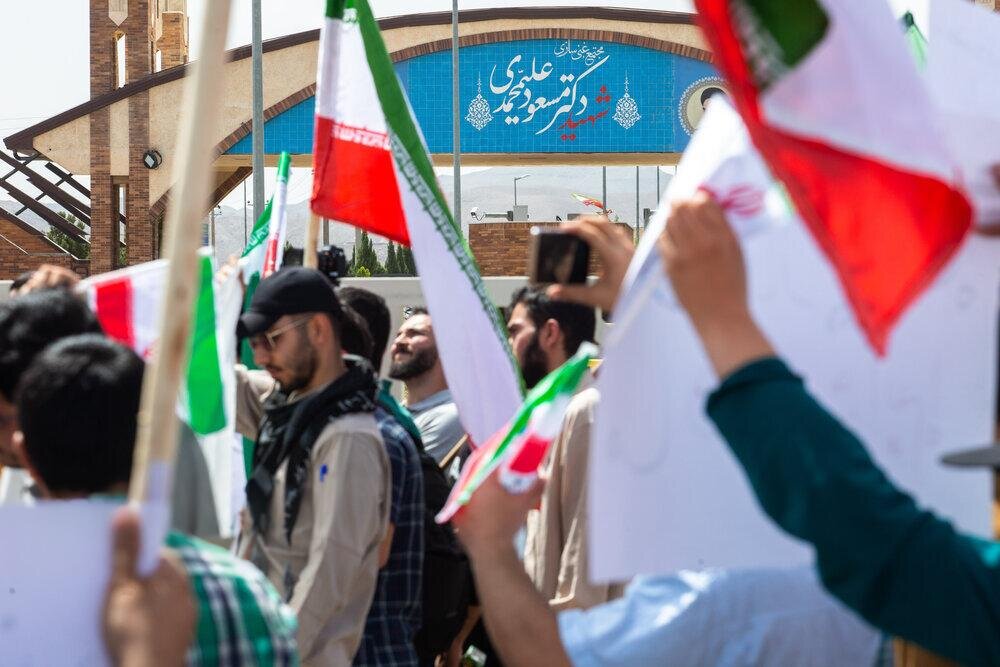‘Enrichment is our right’: Iran’s youth rally behind nuclear program as talks continue

Iranians have a deep-seated love for their country, and that's a big reason why Iran's been around for thousands of years. Whenever the nation is threatened, people from all walks of life tend to put their differences aside and come together to defend it.
The world saw it when Macedonian king Alexander came knocking in 334 BCE, when the Arabs invaded in 633 CE, and again in the 1980s when Saddam Hussein attacked.
Iranians have a deep-seated love for their country, and that's a big reason why Iran's been around for thousands of years. Whenever the nation is threatened, people from all walks of life tend to put their differences aside and come together to defend it. The world saw it when Macedonian king Alexander came knocking in 334 BCE, when the Arabs invaded in 633 CE, and again in the 1980s when Saddam Hussein attacked.
These days, maybe a foreign army isn't the biggest worry, but Iranians are still fiercely protective of what they value, and right now, their peaceful nuclear program is something they hold pretty dear.
This commitment has been on full display in recent days. Hundreds of Iranian students have been touring the country in the past week to rally outside the country’s nuclear facilities. They've gathered at sites including the Fordow Fuel Enrichment Plant near Qom, the Bushehr nuclear facility in the south, and a nuclear research center in Karaj, west of Tehran. Most recently, they rallied outside the Natanz facility in Esfahan province, in central Iran.
“We're here for two reasons,” said a 20-year-old female university student majoring in mechanical engineering. “First, to show our support for the Iranian negotiating team. And second, to make it clear that the youth of Iran stand firmly behind our nation's right to a nuclear program. We see this as a national asset, and the younger generations will not stand by and let it be dismantled."
The protests aren’t happening in a vacuum—they come at a critical moment in Iran’s diplomatic struggles. Since early April, Iran and the United States have been holding indirect talks, aiming to limit Tehran's nuclear activities in return for the termination of sanctions. From the start, Iran has stated clearly that it won't accept just any restrictions. The country intends to continue enriching uranium and will not dismantle any of its nuclear facilities. Despite Iran maintaining these positions for over two decades and repeatedly stating they are non-negotiable, the U.S. seems unwilling to respect these red lines, as its officials have been taking to mainstream media to publicly demand concessions on the nonstarters. This behavior, however, seems to have only strengthened public resolve.
"Uranium enrichment is non-negotiable, not just for this government but for any future one," explained a graduate student in his mid-20s. "This is something we must maintain for future generations. We've lost so many scientists to assassinations over the years, and we've suffered greatly under sanctions. We can't simply abandon this because Trump is putting pressure on us."
The determination seen in Esfahan mirrors the broader national mood. Protesters carried signs reading "Enrichment is Our Right" and "We Will Stand by Our Country till the End."
Analysts argue that Iran's resilience on the matter is precisely why it holds any leverage at all. Amir Ali Abolfath, a North America affairs expert, notes that the U.S. only returned to negotiations because of Iran’s nuclear capabilities. "If we lose this leverage, we lose everything," he said. "Even a new deal could meet the same fate as the JCPOA."
This strategic imperative is well understood by Iran’s negotiating team, as highlighted in recent updates from Ebrahim Azizi, Chairman of the Iranian parliament’s National Security and Foreign Policy Committee. The team, led by Foreign Minister Seyyed Abbas Araghchi, has kept lawmakers closely informed on the progress of talks.
"The briefings from the Foreign Minister and negotiators demonstrate a firm commitment to safeguarding Iran’s national interests, preserving our nuclear industry, and advancing our strategic objectives," Azizi told Iranian media on Sunday.
Leave a Comment